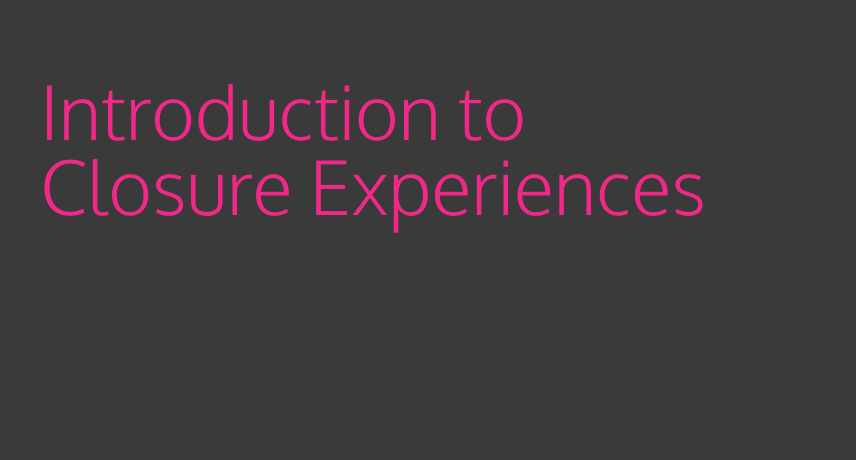

What shall we call the book?
I have been spending a lot of time researching and writing the Closure Experiences book. Which has been incredibly interesting and I cant wait to share it with you next year. The one aspect which I would love your help with is a title.
I have built a quick multiple choice form to get your thoughts on a few ideas. Even write one in of your own.

Introduction to Closure Experiences
This short video provides an outline to Closure Experiences. It explains briefly the customer lifecycle and how this is being effected by a lack of Closure in Services, Digital and Product businesses.

Being put to death by Google should be a good thing
I don’t tend to punch guests as they leave the party, but some companies do the metaphorical equivalent. Not saying goodbye graciously can create a terrible reputation with your customers, and party goers. Now, I could drag up the usual suspects of big old corporations that fail to create amicable endings with their customers but I want to talk about start-ups, and the tech industry, who are sadly drifting down the path of short-termism that we usually associate with the financial services industry.

Bowie. Closure.
We all have to bridge that gap between the ‘Now’ and the ‘Then’. The being alive, and not being alive. Bowie has inspired in life. In death. And has uniquely stepped inspiringly between.

The psychosis of consumption - The Consumer Self and the Civic Self.
When it comes to consumption we have 2 conflicting personalities that work against one another - our consuming self, and our civil self. Their experiences are supported by separate systems and different organisations. The battleground is the customer experience, the prize - improving the negative impact of consumption.

Ctrl+Alt+Pulp/Print
Although an office based pulping and paper-making machine might bring an end to annoying footers about printing emails, it will achieve lots around closure experiences in the office environment.
Epson have recently released the worlds first office paper making machine, that turns waste paper in to new sheets. Although this is an enormous achievement for Epson, and will be greatly appreciated by many large companies and organisations, its real achievement is dealing with 2 closure experience issues common in offices. Firstly, it reveals the end of the paper life-cycle to the people that use paper. Secondly it securely destroys unwanted documents while the authors of those documents witness it.

Sky fallen for cliche business approach to Closure.
Sky has displayed the usual paranoid business approach to customers leaving. In the process damaging the brand and providing some terrible memories for its customers.
People who have wanted to leave the Sky service have been trapped in sales conversation for over an hour, while the customer service team tries to sell them more products and stop them leaving. This is hard for many people to stand, and some give in and sign up for more services. Its a little like holding on to someones leg when you get dumped - it doesn’t build respect.

Hospice care; an inspiration to industries that deny closure.
There is a lot to learn from Hospice care when approaching the issues we have with consumption. Accepting and designing for the end would be a good start.

Virgin improves Closure through new transaction model
Virgin trains has announced an automatic payback scheme for delayed passengers. This is unique for a number of reasons, but the most interesting one is as a closure experience for users. In one initiative they have created a healthy Closure experience, changed the transaction model, and disrupted an industry.

The rightful place for the Right to Die sits with individuals, not religion and medicine
Religion has owned the right to die for centuries. The common religious package of ‘a good life’ as an access to heaven is scattered across all structured belief systems in one form or another and is the power base by which religion controls, or “inspires” its followers. So it comes as no surprise that church leaders from all faiths recently announced their objection to the Assisted Dying Bill being pursued in the UK’s House of Commons.

This damaging gap is a silent environment killer
Many companies overly focus on the On-Boarding experience because selling to more customers means more money -the status quo of business. Canon is no different this regard. The way they sell printer ink is a good example of a companies bias to getting more customers, over the Usage of the product or the Off-Boarding when the product comes to the end of its life.
